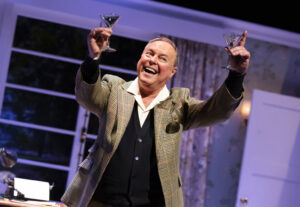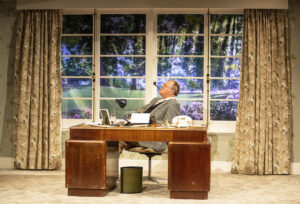Robert Daws charms as the great comic writer
★★★

There’s a lot to enjoy in this one-man play about PG Wodehouse, especially since the man in question is the very talented Robert Daws.
The world is divided between those who love PG Wodehouse’s books and those who hate them. Well, that’s not strictly true because there must be a large proportion of the world that has no opinion at all about him. But if you do have a positive view about the man known to his friends as Plum, I think you’ll like Wodehouse In Wonderland which I saw at the Haymarket in Basingstoke.
I say ‘think’ because, although there are many quotes from the great man’s books, this is not a play about Jeeves And Wooster, or Lord Emsworth. Instead, it’s a dip into the mind of the man himself, and Wodehouse alone on stage is not as funny as his books.
Then again, what do I know? I’m reminded of Plum’s opinion of reviewers: “Has anybody ever seen a drama critic in the daytime?” he said. “Of course not. They come out after dark, up to no good.”
For someone who seems quintessentially English, Wodehouse spent a lot of time in America. As a young man in the period after the First World War, he was there writing the lyrics to a number of successful musical comedies, working mainly with Guy Bolton and the great composer Jerome Kern. After the second world war, he took up permanent residence in the USA and never returned to England. And it is quite late in his life that we meet him in his home in New York State.
We’re treated to much Wodehouse wit, as he talks in letters to his beloved daughter Leonora (“without whose never-failing sympathy and encouragement this book would have been finished in half the time”), and to an unseen biographer who asks him earnest questions about the effect of his almost parent-less childhood on his writing.
William Humble’s script is certainly amusing, and Robert Daws is such a brilliant actor that he is able to capture the whole audience with a smile and an anecdote.
But compared to one of Wodehouse’s novels, this delightful play lacks one crucial element. As the man himself said: “If they aren’t in interesting situations, characters can’t be major characters.” In the first act at least, Wodehouse isn’t in an interesting situation. There is none of the great conflict that you get between say Jeeves and Wooster, nor the complex plots that Wodehouse spent weeks working out and that propelled his characters into ever more hilarious plights. Truth be told, unlike his characters, Wodehouse is not larger than life.
A delightful but not entirely successful attempt to pin down Wodehouse
Not only that, he erects a considerable defence to prevent anyone from discovering any interesting depths. He won’t allow his biographer- or us- to dip into more than the shallows of his mind. He once said: “It was not that I had any particular message for humanity. I am still plugging away and not the ghost of one so far, so it begins to look as though, unless I suddenly hit mid-season form in my eighties, humanity will remain a message short.”
So, writing a play about PG Wodehouse is a challenge, somewhat like keeping a souffle from sinking. William Humble only meets it fully when we get to the second act. It’s then that the twin tragedies of Wodehouse’s adult life are revealed. As he put it himself: “it’s always just when a chappie is feeling particularly top-hole, and more than usually braced with things in general that Fate sneaks up behind him with a bit of lead piping.”
Add to which, he was ostracised or, as he might have put it: “the supply of the milk of human kindness was short by several gallons”. We see, illuminated in flashes as it were, the depths to which he must have sunk, before pulling himself back up using the safety line of writing comedy.

And writing was his life. Whatever else there was going on, he worked hard at his typewriter, turning out three or four books a year. He appears frivolous and out of touch with the real world. Indeed, his critics describe him that way, and dislike the way he creates a bubble in which his characters and their stories exist. Yet, from the extracts that William Humble regularly inserts into the proceedings, we can tell that Wodehouse showed a level of craftmanship his contemporaries struggled to equal. His contortions of the English language are priceless and, even though his characters are not realistic, they are vividly real.
Oh, and he sings songs. I mentioned Wodehouse’s early success as a lyricist. In the 1920s, he was renowned as much as a writer of musical comedies as he was a comic novelist. We’re treated to quite a few of his songs in this play. I’m pleased to report Mr Daws has a fine voice.
It’s not easy to keep a show visually interesting when you only have one person on a stage and no special effects, but director Robin Herford injects a good rhythm into the production. The design by Lee Newby is just right. It’s a naturalistic reproduction of a study with a writing desk dead centre, in a bright and beautiful house where, metaphorically, the sun always shines.
To sum up, this is a slightly flawed play but still a pleasurable evening, made exceptional by the quality of Robert Daws’ performance. You can’t help but be charmed by him, as charmed as I imagine you would have been by meeting Plum himself.
This is a production that could easily run in the West End, where you would pay £100 to see it. On this tour of the UK, you can probably catch it for under £30. Top hole, I say.
Wodehouse In Wonderland is touring the UK until the end of April 2023. More details at cahootstheatrecompany.com/wodehouse-in-wonderland
Paul received a free review ticket from the producer.